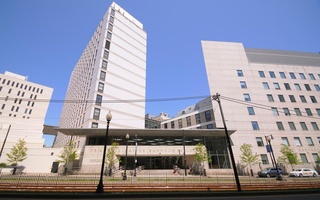After many years of negotiations, Harvard School of Public Health administrators and student government representatives are finally close to reaching an agreement on standardizing teaching assistant salaries across the nine departments of the school.
At the moment, teaching assistants in the lowest-paid department may make as little as a quarter of what their counterparts in the highest-paid department do, according to former student government president Guy D. Harling. In a given quarter, one HSPH teaching assistant can be paid $500 while another earns $2,000 in a different department, he said.
Harling, a fifth-year doctoral student at HSPH, has spearheaded the student government’s push for standardized teaching assistant pay for three years, since one department angered students by cutting pay by 25 percent about two weeks before the beginning of a semester. Now, the school is at last putting the finishing touches on a policy that it expects to adopt by the end of the month.
Harling attributes the drawn-out process largely to the fact that the policy requires the agreement of 11 different groups: the school’s central administration, student body representatives, and the nine departments.
"[The departments] are very different sizes, shapes, and much like the schools of Harvard, they have different levels of financial security—a lot of very different agendas about what is reasonable and what is affordable," Harling said.
Nancy Turnbull, associate dean for educational programs at HSPH, agreed, "Figuring out how we want to change things and what the financial implications would be and how we move towards a more standardized process with so much variability at the moment has been complicated."
According to Harling, the change requires setting standards about what to expect from professors and what to expect from students in classes of any kind.
The variability in salaries at present may result from the disparity in teaching assistants’ work: different class sizes, different work hours, and different tasks—like teaching sections versus grading papers.
"The credits are the same regardless of what class you are in, so it should be the same amount of money per student for each course for each department to pay TA’s, and a lot of the process has been try to figure out how that works," Harling said.
That required looking closely at the many departments’ curricula. "We’ve had to get a very detailed understanding for each course at the school that needs a teaching assistant," Turnbull said. "We have hundreds of courses in the school, so in order to understand what the implications of various changes would be, we’ve had to do very detailed analysis."
After a year of talking to each department about its payment policies, Harling found that some chose to pay depending on the number of students in the class and others based on the number of hours put in by the teaching assistants.
But even a standardized salary may not be enough to satisfy students. "The first goal is just to bring everybody up to something reasonable," Harling said. "I still think on average we’re being underpaid for what we are doing, but maybe others are being underpaid for what they do too."
Harling said that the student government has initiated discussions with the administration about the salaries of teaching assistants in other Harvard University schools. While teaching assistants in the Graduate School of Education, the Kennedy School, and the Faculty of Arts and Sciences are paid considerably more than those at HSPH, Harling noted that the hours and work load can also be more demanding elsewhere.
"You don’t come to HSPH to TA for money...you come because you care about the course," Harling said.
With the policy in the works but not yet sealed, students are optimistic but not yet triumphant.
"“Until we see something on paper, I remain cautious that things may keep rolling," Harling said. "The administration is definitely available and generally quite responsive. It’s just not necessarily easy to put together something."
Douglas W. Dockery, chair of the Department of Environmental Health at HSPH, said, "I agree with the students that we do need equitable pay across the different departments and am hoping we come to a resolution on this.... I think we all agree that it’s a big issue and want to resolve it. It’s just a question of money and finding the resources to make this work."
Natalie K. Meyers, the current HSPH student government president, said, "If we could see that closed this year, that’d be a huge success... institutional change takes more than just one term or...one year. I’m encouraging the rest of the student government to have these small wins all throughout."
—Staff writer Cynthia W. Shih can be reached at cshih@college.harvard.edu.
Read more in News
Seniors Chosen as Rhodes ScholarsRecommended Articles
-
New HSPH Center To Address FluWith flu season looming, the Harvard School of Public Health recently founded a new research center that will focus on
-
Harvard School of Public Health Partners with Cyprus GovernmentThe government of the island nation of Cyprus has pledged $8.8 million towards increasing opportunities in public health education, research, ...
-
HSPH Students Gather to Hear UN GoalsStudents from across Harvard’s schools gathered Monday morning at the School of Public Health to attend a live videocast of the UN’s Millennium Development Goals—which was taking place in New York City—followed by a discussion between faculty and students.
-
 College Students Embrace Public Health
College Students Embrace Public Health -
Harvard School of Public Health Discusses Maternal MortalityMaternal mortality took center stage at the Harvard School of Public Health in a forum discussion moderated by reporter and Huffington Post columnist Lisa Belkin last Friday.
-
TV May Halve Sperm CountWatching too much television can lower a man’s sperm count by up to 44 percent, according to a recent study conducted by the Harvard School of Public Health.













